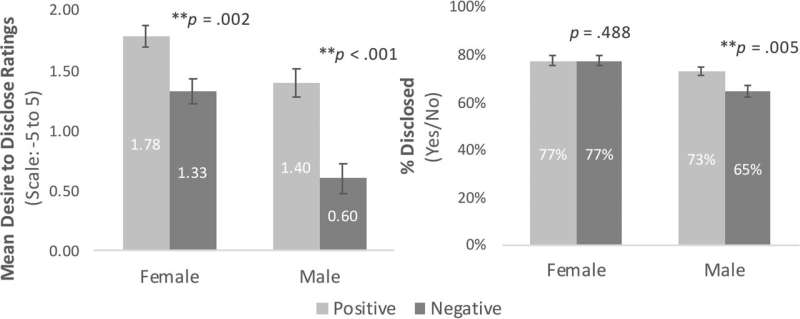This article has been reviewed according to Science X's editorial process and policies. Editors have highlighted the following attributes while ensuring the content's credibility:
fact-checked
peer-reviewed publication
trusted source
proofread
Men less likely than women to share negative information, says study

A new study from Carnegie Mellon University, Bayes Business School (formerly Cass), and Bocconi University has found that men are less eager and likely to share negative information than women, while there was little difference when it comes to positive news.
Published in the Journal of Experimental Social Psychology, the authors suggest that this may be due to a greater concern among men over how other people will see them, resulting in a tendency to self-promote by sharing positive information about themselves and not revealing their negative experiences to others.
Dr. Erin Carbone, Visiting Assistant Professor in the Department of Social and Decision Sciences at Carnegie Mellon University and first author of the study, said, "The results from our studies revealed a consistent, and to the best of our knowledge not previously identified, nuanced pattern, wherein the tendency for women to disclose more than men depends crucially on the nature of the information shared."
"These findings can help make sense of the existing literature, as well as clarify some existing stereotypes, around gender differences in disclosure."
Most of the existing research on gender differences and information sharing predates the internet. Given that we live in a world where people readily post information on a variety of platforms on a daily basis, this new study offers insights into the way we share, as well as the consequences of sharing, in the digital age.
To explore gender differences in the sharing of different types of information, the researchers carried out three different experiments with over 1,000 people. In the first study, people self-reported times when they felt like they were "dying" to disclose information to others, then indicated whether they actually had shared the information.
Although men and women generated similar numbers of instances of wanting to share positive information (e.g., about a promotion), men were far less likely to report wanting to share negative information (e.g., a failure to receive a promotion). Two further studies enabled the team to quantify the desire to disclose and aggregate participants' desire as well as their propensity to disclose positive or negative information about different topics and experiences.
The study also found that women reported greater satisfaction than men with their own level of disclosure, whereas most male participants reported a greater propensity to withhold information about their thoughts and feelings even when it might have been better to share it with others.
Professor Irene Scopelliti, Professor of Marketing and Behavioral Science at Bayes Business School (formerly Cass) and one of the authors of the study, said, "Disclosure is increasingly prevalent and permanent in the digital age. The advent of social media and digital communication channels has enabled unprecedented levels of information sharing, which is accompanied by an array of social and psychological consequences."
"Our results show that gender remains an important fault line when it comes to the desire and propensity to disclose negative information, and men may be differentially advantaged by, or vulnerable to, the consequences of information sharing compared to women."
More information: Erin Carbone et al, He said, she said: Gender differences in the disclosure of positive and negative information, Journal of Experimental Social Psychology (2023). DOI: 10.1016/j.jesp.2023.104525
Journal information: Journal of Experimental Social Psychology
Provided by City University London




















